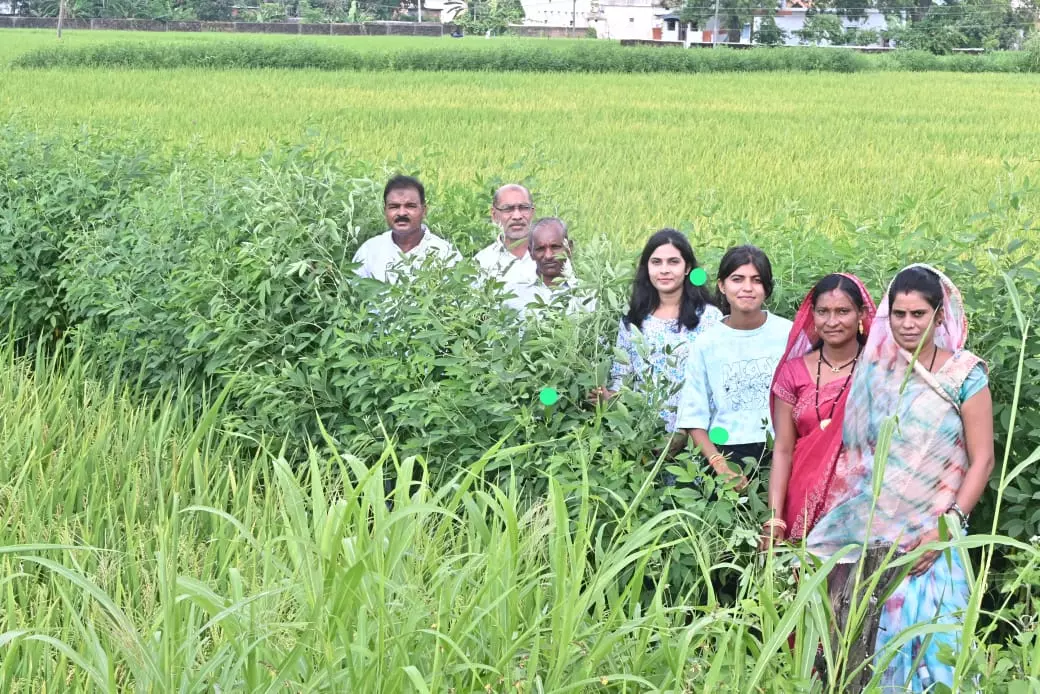Parastarai village leads water conservation revolution in Chhattisgarh

Parastarai village has now turned a model village for water conservation (DC)
Raipur: A drought-prone village in Chhattisgarh’s Dhamtari district has hogged limelight for showing the way for conservation of water.
Identified as one of the 150 districts across the country facing serious crisis of groundwater depletion in 2022, Parastarai village, around 80 km from here, has now turned a model village for water conservation, thanks to the community-driven initiative by the villagers to go for crop diversification by shunning the practice of two-paddy crop a year.
“The depletion of groundwater was identified in a survey conducted by the Jal Shakti Mantralaya in 2022. It highlighted the irony that despite being surrounded by four dams- three in Dhamtari district and one in neighbouring Kanker district, the water level was depleting due to practice of intensive paddy cropping in Rabi and Kharif seasons.
Hence, an awareness was created among the farmers to adopt the practice of crop rotation by going for one-paddy crop and choosing pulses and oilseed as second and third crop in a year”, a senior district officer said on Sunday.
Paddy is known as a water intensive crop while pulses and oilseed crops require less water.
The initiative has reaped huge benefits for the village in terms of improvement in groundwater levels and inspired other villages to emulate the practice, local sarpanch Parmanand Adil said.
The village comprising 300 families has earlier been identified as perennially drought prone despite being situated close to the Ravishankar Reservoir.
“All the villagers have collectively decided that any farmer who sows paddy during the Rabi season will incur a fine of Rs 27,000 per acre. Additionally, in Rabi season, if the water from paddy fields will flow into other farmers’ fields of pulses and oilseeds then the paddy grower will face an extra fine of Rs 37,000 per acre”, Mr Adil said.
The punitive measure has proved to be an effective deterrent for the farmers in shunning the practice of two-paddy crops a year”, he added.
“The improvement in groundwater levels in many villages, including Parastarai, is a result of villagers’ environmental awareness. Dhamtari district has now emerged from the endangered category concerning groundwater”, Dhamtari district collector Namrata Gandhi said.
Dhamtari is hosting a two-day ‘Jal Jagar Maha Utsav’ from October five this year to showcase the achievements of Parastarai in water conservation.
Identified as one of the 150 districts across the country facing serious crisis of groundwater depletion in 2022, Parastarai village, around 80 km from here, has now turned a model village for water conservation, thanks to the community-driven initiative by the villagers to go for crop diversification by shunning the practice of two-paddy crop a year.
“The depletion of groundwater was identified in a survey conducted by the Jal Shakti Mantralaya in 2022. It highlighted the irony that despite being surrounded by four dams- three in Dhamtari district and one in neighbouring Kanker district, the water level was depleting due to practice of intensive paddy cropping in Rabi and Kharif seasons.
Hence, an awareness was created among the farmers to adopt the practice of crop rotation by going for one-paddy crop and choosing pulses and oilseed as second and third crop in a year”, a senior district officer said on Sunday.
Paddy is known as a water intensive crop while pulses and oilseed crops require less water.
The initiative has reaped huge benefits for the village in terms of improvement in groundwater levels and inspired other villages to emulate the practice, local sarpanch Parmanand Adil said.
The village comprising 300 families has earlier been identified as perennially drought prone despite being situated close to the Ravishankar Reservoir.
“All the villagers have collectively decided that any farmer who sows paddy during the Rabi season will incur a fine of Rs 27,000 per acre. Additionally, in Rabi season, if the water from paddy fields will flow into other farmers’ fields of pulses and oilseeds then the paddy grower will face an extra fine of Rs 37,000 per acre”, Mr Adil said.
The punitive measure has proved to be an effective deterrent for the farmers in shunning the practice of two-paddy crops a year”, he added.
“The improvement in groundwater levels in many villages, including Parastarai, is a result of villagers’ environmental awareness. Dhamtari district has now emerged from the endangered category concerning groundwater”, Dhamtari district collector Namrata Gandhi said.
Dhamtari is hosting a two-day ‘Jal Jagar Maha Utsav’ from October five this year to showcase the achievements of Parastarai in water conservation.
( Source : Deccan Chronicle )
Next Story

